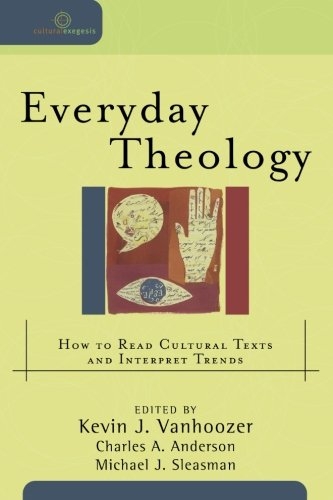Everyday Theology
 Kevin J. Vanhoozer, Charles A. Anderson, Michael J. Sleasman, eds., Everyday Theology: How to Read Cultural Texts and Interpret Trends (Grand Rapids: Baker Academic, 2007), 285 pages, ISBN 9780801031670.
Kevin J. Vanhoozer, Charles A. Anderson, Michael J. Sleasman, eds., Everyday Theology: How to Read Cultural Texts and Interpret Trends (Grand Rapids: Baker Academic, 2007), 285 pages, ISBN 9780801031670.
Everyday Theology deals with the daily encounters that influence people’s thoughts, those multitudes of encounters that no theologian can afford to ignore. The book considers popular cultural texts and trends that occupy the minds of Christians, aiming to create a methodology of interpreting them theologically. The authors contend that theology cannot be done in a vacuum; culture provides the platform for theologizing.
Vanhoozer and his counterparts see culture as an arena of interpretation where context must be understood. Culture is an objectification of the human spirit, ideas and essences made real. A major question dealt with is whether culture is profitable or detrimental to someone’s spiritual well being. If you find an aspect of your culture to be corrupted, should you run from it or try to cleanse it?
The book’s approach to interpretation is the text-context methodology where the context of the author, the context of the text, and the context of the reader are highly considered.
Everyday Theology is organized into four parts with contributions from various scholars. “Part 1: Introduction: Towards a Theory of Cultural Interpretation,” lays the foundation for the rest of the book. In this part Vanhoozer endeavors to answer the question; “why do a cultural interpretation?” He defines cultural hermeneutics, defends the rationale for doing cultural hermeneutics and then proposes a methodological approach towards cultural exegesis. “Part 2: Reading Cultural Texts” offers real life examples on how to read cultural texts and trends. In this section different cultural trends are explored. For example, Darren Sarisky offers a theological account of Eminem and David G. Thompson deals with the Universal Declaration of Human Rights. “Part 3: Interpreting Cultural Trends” explores some major cultural trends within the society, while “Part 4: Concluding Untheoretical Postscript” concludes the book by offering a concrete example on how to apply knowledge gained in cultural exegesis to the contemporary life.
Everyday theology is not a theological discipline but rather the theological practice of every believer. Christians should read the Bible as well as their cultural “texts” and trends so that they can understand how their culture is influencing their own faith and those around them. What are theological takeaways from Rap culture? How should your theology affect your interactions concerning Human Rights in the Blogosphere? Can theologians afford to ignore such questions?
I appreciate how the book engages issues of both local American and international concern. This makes more room to ask how to do theology that connects with everyone. How should we challenge trends that are undermining Christian belief and values? By becoming more culturally literate, the Church will be able to advance her mission in the world effectively.
Reviewed by Michael Muoki Wambua
Read excerpts from Everyday Theology: http://assets.bakerpublishinggroup.com/processed/book-resources/files/Excerpt_Vanhoozer_EverydayTheo.pdf?1362590645
Category: Fall 2010, Living the Faith, Pneuma Review


